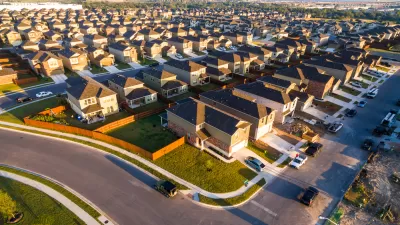A growing movement to implement a nationwide property tax in China is meeting resistance from the rich and powerful.

"This year it seemed China was finally going to make headway on an idea familiar to U.S. homeowners: a property tax," according to Dominique Fong. Now it seems that possibility is no longer a political reality—for now at least.
"Lu Kehua, China’s vice housing minister, last month said the government needed to 'speed up' a property-tax law," to "tame" speculation in the real estate market and to provide revenue for local governments. Despite the support from a high-ranking official, "the annual National People’s Congress came and went this month with no discussion of the topic," according to Fong.
The political opposition to the idea of a property tax comes from wealthy and politically powerful Chinese residents—a difficult group to win over in any country. The political opposition to the property tax idea claims it does not want to slow the economy by imposing new changes to the country's tax structure.
There have been a few property tax experiments in the country since 2011. As Fong reports, property taxes in Chongqing and Shanghai, both unique in their approach, were considered failures.
[The Wall Street Journal article might be behind a paywall for some readers.]
FULL STORY: China Kicks Property Tax to the Curb—For Now

Rethinking Redlining
For decades we have blamed 100-year-old maps for the patterns of spatial racial inequity that persist in American cities today. An esteemed researcher says: we’ve got it all wrong.

Planetizen Federal Action Tracker
A weekly monitor of how Trump’s orders and actions are impacting planners and planning in America.

California High-Speed Rail's Plan to Right Itself
The railroad's new CEO thinks he can get the project back on track. The stars will need to align this summer.

US Senate Reverses California EV Mandate
The state planned to phase out the sale of gas-powered cars by 2035, a goal some carmakers deemed impossible to meet.

Trump Cuts Decimate Mapping Agency
The National Geodetic Survey maintains and updates critical spatial reference systems used extensively in both the public and private sectors.

Washington Passes First US ‘Shared Streets’ Law
Cities will be allowed to lower speed limits to 10 miles per hour and prioritize pedestrians on certain streets.
Urban Design for Planners 1: Software Tools
This six-course series explores essential urban design concepts using open source software and equips planners with the tools they need to participate fully in the urban design process.
Planning for Universal Design
Learn the tools for implementing Universal Design in planning regulations.
City of Camden Redevelopment Agency
City of Astoria
Transportation Research & Education Center (TREC) at Portland State University
Regional Transportation Commission of Southern Nevada
Toledo-Lucas County Plan Commissions





























